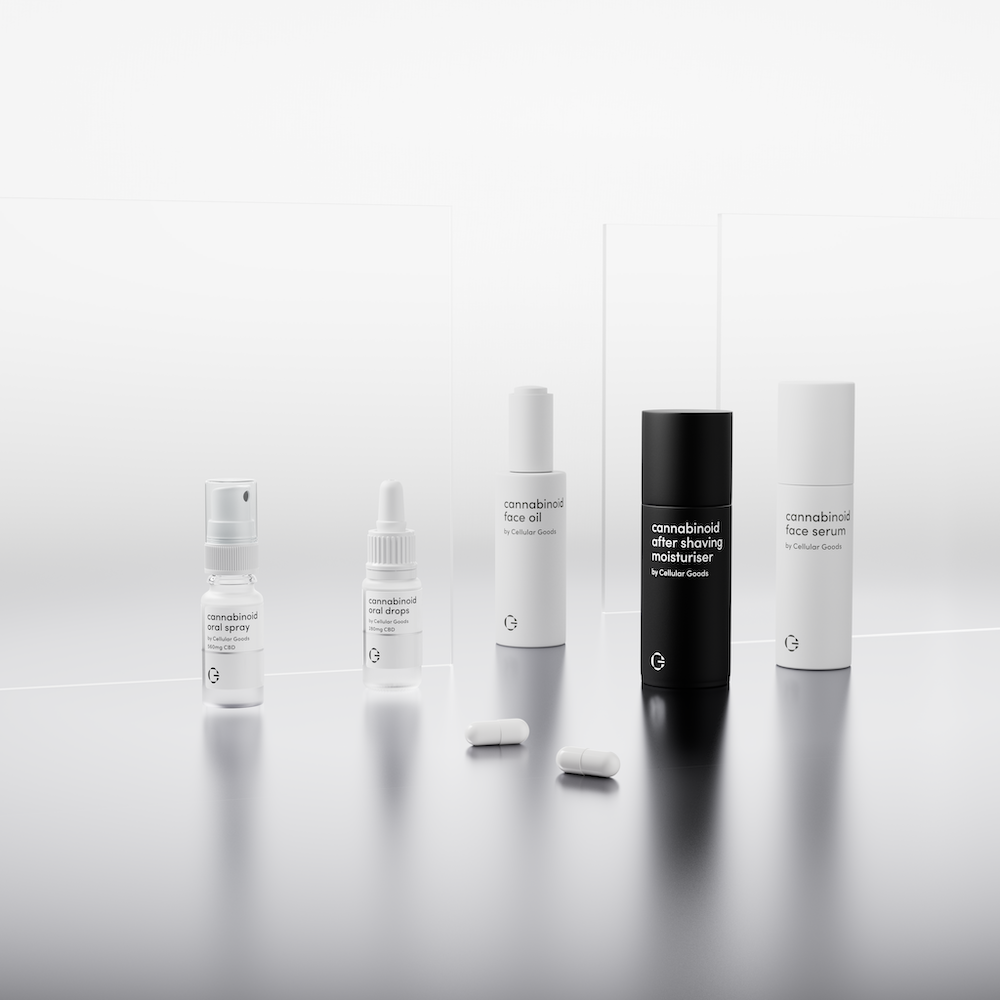A new paper from skincare company, Cellular Goods has confirmed the potential benefits of CBD and CBG for signs of ageing or skin irritation.
A report by Cellular Goods shows that CBG and CBD may offer an alternative to some of the harsher chemical anti-ageing treatments that have grown in popularity over the past few years.
This includes ingredients such as vitamin C, retinoids, alpha- and beta-hydroxy acids which are can be irritating to the skin.
The results published by Cellular Goods, indicate that CBG and CBD may inhibit the inflammation and lipid peroxidation caused by Type B Ultra-Violet (UVB) radiation, which is one of the biggest contributors to ageing and disease.
UVB radiation plays a role in causing sunburn and skin cancers, with UV exposure accounting for 80 per cent of extrinsic ageing.

Speaking with Cannabis Health, Alexia Blake, head of product development at Cellular Goods said: “CBG, CBD and their blends were very effective for inhibiting inflammation caused by UVB exposure. Similarly, these cannabinoids were effective at inhibiting lipid peroxidation caused by UVB exposure. One interesting finding in the lipid peroxidation study was that CBD was less effective at higher concentrations, whereas CBG became more effective as we increased the applied concentration.”
This is the second paper in recent weeks, that confirms the anti-inflammatory and antioxidant properties of CBD and CBG in skincare.
The findings of the paper follow earlier reports from Williow Bioscience into the effectiveness of CBG for signs of ageing and redness from irritation.
The company also outlined the effect CBD had on the irritation caused by skincare ingredients such as retinol, reporting that CBG had double the antioxidant capacity of CBD.
Cellular Goods tested the cannabinoids at commercially available levels on cultured human tissues to determine the findings.
Alexia explained: “We conducted our tests on an in-vitro human tissue model called EpiDerm. The human tissues are essentially grown in a lab and considered to be equivalent or representative of real human skin in terms of composition, structure and organisation. This means we get a clear picture of what will happen when cannabinoids are applied to “real” human skin on a consumer.
“Working with EpiDerm means we can test cannabinoid concentrations that are equivalent to what we include in our products or what consumers will use. This can be a challenge for animal testing, as the dose often needs to be adjusted depending on the animal species in question. This can present a challenge when trying to interpret the results for human applications. Fortunately, with EpiDerm we don’t have this issue and can conduct our research using cannabinoid concentrations that are the same as what will be used in the real world.”
The study also revealed that CBD may counteract photoaging (UV exposure) and inflammation more effectively than Vitamin C.
Vitamin C has been one of the biggest trends in skincare for the past few years, due to its supposed brightening and anti-ageing properties, but the paper states that cannabinoids may be more easily tolerated thanks to their anti-inflammatory and antioxidant properties.
Alexia said: “What we’ve seen from our research is that both CBG and CBD possess very potent anti-inflammatory and antioxidant activity. In many of these studies, Ascorbic Acid (Vitamin C) is used as a positive control for us to compare against, and we’re seeing that CBG and to a lesser extent CBD are equally if not more effective than Vitamin C when it comes to providing anti-inflammatory or antioxidant benefits, so that gives us some frame of reference when we think about effectiveness.
“Lastly, we’ve tested our Serum, Face Oil and After Shaving Moisturiser products on real-life volunteers with sensitive skin at a research clinic with a dermatologist, and saw that our products were extremely suitable for sensitive skin. This is very exciting because it means that, unlike many other anti-ageing ingredients, cannabinoids like CBG are extremely well-tolerated and can be used by a wide range of consumers, including those with sensitive skin.”

Cellular Goods skincare
Cellular Goods was established in 2018 to develop research-backed and efficacy led products. The products are made using lab-produced CBD and CBG which means it does not need to cultivate cannabis, which they believe is a greener alternative to field-grown.
The Cellular Good skincare line contains serum, face oil and after-shave moisturiser. The ingestible collection includes a tincture, spray and capsules. The company has incorporated the findings of this report into developing their range.
Alexia said: “There are several ways in which customers can incorporate cannabinoids into their routines. One option is to incorporate our products, such as the Serum and After Shaving Moisturiser, into your morning routine to harness the antioxidant benefits of these CBG products. This is similar to how other antioxidant-based products, such as those formulated with vitamin C, are used, with the idea being that antioxidants can counteract some of the damage caused by daily UV exposure.
Alternatively and thanks to the skin-soothing benefits of CBG, our products can also be used in the evening to calm skin. This may be particularly beneficial for consumers who have dry or sensitive skin, or who are applying other products with irritating ingredients.
She added: “Beyond that, we have a range of high purity lab-made CBD ingestibles that are produced under very stringent quality standards and, from what we’re hearing from customers and keeping in line with other industry consumer surveys, seem to be particularly helpful for improving sleep.”
- David Beckham-backed CBG skincare line launches new products
- The benefits of CBG
- What’s the difference between CBD and CBG?
- CBD vitamins could boost your wellbeing this winter
- Beckham-backed cannabis brand floats on LSE
The post CBD and CBG show potential for fighting signs of ageing appeared first on Cannabis Health News.

